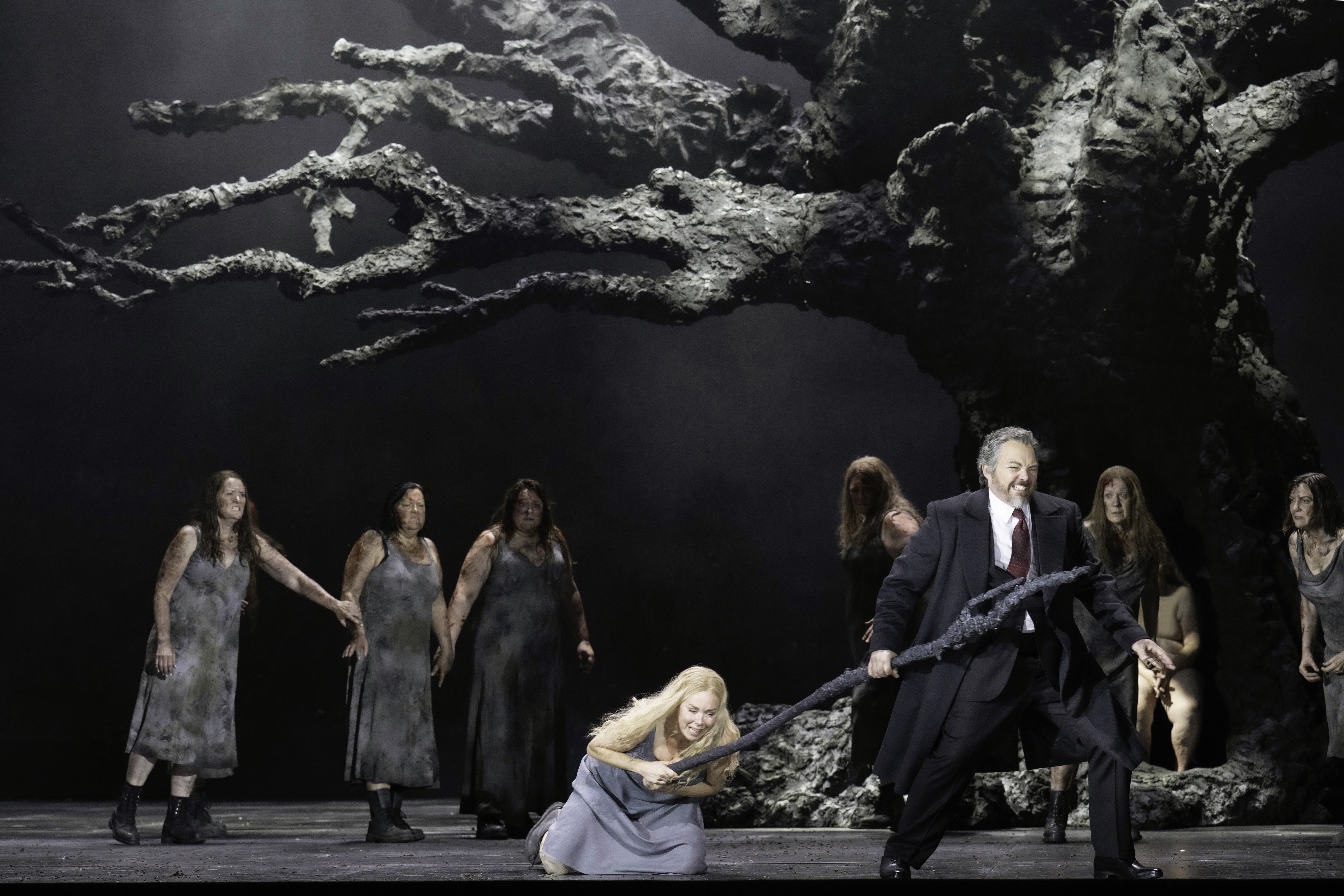Die Walküre
Royal Opera House, London WC2; until 17 May
Pimpinone
Linbury theatre, Royal Opera House, London WC2; until 17 May
The Excursions of Mr Brouček
Barbican, London EC2
Blind to the effects of his more objectionable views, alert to the impact of his music, Wagner knew Die Walküre – the second opera in his four-part Ring cycle – would shock audiences. He told Liszt, his close contemporary as well as father-in-law, that the work was written for those who could take a certain amount of strain, which did not include the “incompetent and the infirm”. The score ambushes us from the start, opening in the midst of a raging storm. Cellos and basses thunder up and down in demonic staccato unison until brass and wind enter, dissonant, blaring, ratcheting up the tension. All this, scarcely one minute into a five-hour work (including intervals). Already our nails are clawing our palms.
As part of the Royal Opera’s new Ring (due for completion in the 2027-28 season), Die Walküre has opened in a powerfully cogent staging by the team that set all in motion with Das Rheingold in 2023: the company’s former music director, Antonio Pappano; the Berlin-based Australian director Barrie Kosky; and the German designer Rufus Didwiszus. Lengthy it might be, but Walküre is tautly constructed, often suggested as a good entry point for navigating Wagner’s unwieldy epic. Long-lost twins fall in love. Their child, unsullied by alien blood, will be the hero Siegfried. The god Wotan casts out his beloved daughter Brünnhilde and determines her fate. On the evidence so far, Kosky’s Ring for Covent Garden (his first was in Hanover, completed in 2011), as well as being brilliantly sung by all and exceptionally well played by the Royal Opera orchestra, is told with stark clarity.
An unclothed Erda, or Mother Earth (the actor Illona Linthwaite), is omnipresent, as she was in Rheingold. She will again displease those who are displeased by octogenarian nakedness. Her frail beauty is an unsettling emblem of the summer and the winter of life. In contrast, Fricka (Marina Prudenskaya), wholesome, chilly and glossy, is there to uphold the strictures of marriage: a glamorous Venus in furs who arrives in what could be a replica of the armoured Mercedes 770 “Grosser” used to transport Hitler. As a Jew living in Germany, Kosky has spoken of the impossibility of ignoring the association between Wagner and the Nazis, but here any references are oblique. For a predominantly British audience, he has emphasised instead the layered humanity of Wagner’s saga, its exploration of greed, power and love.
A dominant metaphor throughout is the World Ash Tree, rich in Teutonic symbolism, reaching from earth to heaven but now stricken by moral apocalypse and ecological disaster. We see it ossified, blackened, smoky and hollowed out, like a network of catacombs. At the end, in a clever rethinking of the usual rock on which the disgraced Brünnhilde is abandoned, the tree encloses her, its trunk the cell in which, like an anchoress, she must endure her living death until rescued by Siegfried.
The Valkyries are not helmet-wearing dominatrices but woeful wraiths
The Valkyries are not helmet-wearing dominatrices but woeful wraiths
The cast has no weakness. As Siegmund and Sieglinde, Stanislas de Barbeyrac and, in her thrilling role debut, Natalya Romaniw, found limitless vocal capacity in their Act 1 ecstasy, riding freely above the large orchestra playing fortissimo. Each one of the eight Valkyries embraced the hysterical sorrow of their music: these are not helmet-wearing dominatrices of popular comic culture but woeful wraiths, carrying the powdery ashes of dead heroes back to Valhalla. In the central role of Wotan, Christopher Maltman, cast as a self-admiring entrepreneur in a dark suit, sings with the nuance of Lieder. Occasionally challenged in the long lines of his immense Act 2 monologue, he is always masterful, his painful depression in the face of his dilemma, caught between marital obedience and filial love, tenderly conveyed. The moment of farewell to Brünnhilde – the characterfully audacious Elisabet Strid, whose full range we will encounter in the next two operas – was heart-rending.
Pappano, newly named as the Royal Opera’s first conductor laureate, immersed for so many years now in this music, paces everything naturally, without pushing or dragging. He gives his singers support as needed, drawing out inner orchestral details, shaping every phrase with loving perception. After a spectacular final aural and visual conflagration – see it in cinemas from Wednesday – the full orchestra took their bow on stage along with everyone. The applause was as long and loud as any I can remember at Covent Garden.
Wagner operas are not entirely without humour: next year comes Siegfried, considered the “scherzo” of the Ring, though it’s all relative. The following night at the Linbury theatre, Pimpinone by Telemann, staged by members of the Jette Parker Artists programme, was not quite the tickling salve you might have hoped, but it did offer a few smiles, and brevity. This 1725 opera was originally seen as three interludes between Handel’s Tamerlano. Other music from Telemann’s enormous body of orchestral work has been added, crisply played by the visiting orchestra of English National Opera, to make a 90-minute work without interval.
Newsletters
Choose the newsletters you want to receive
View more
For information about how The Observer protects your data, read our Privacy Policy

Vespetta (Isabella Díaz), a waspish young maid whose big skirt usefully doubles as a Christmas tree, gets the better of her cloddish but wealthy employer Pimpinone (Grisha Martirosyan) and ends up marrying him. Stylishly directed by Sophie Gilpin, conducted by Peggy Wu and designed by Anna Yates, wittily and elegantly sung, Pimpinone is a reminder that Telemann’s 35 surviving operas are not obviously ripe for revival.
At the Barbican, the London Symphony Orchestra continued its Janáček series, also being recorded, with conductor emeritus Simon Rattle, a long-time advocate of the composer’s astounding and singular music. Their Jenůfa was released on LSO Live last week. The Excursions of Mr Brouček is far more of a rarity, bizarre and satirical and with a libretto as easy to untangle as, say, string theory. It works wonderfully in the concert hall. No one need worry whether the sausage-and-beer-loving Brouček – sung terrifically by Peter Hoare, leading a first-rate cast – has joined the crusades or flown to the moon or drunkenly stayed at home in Prague. In counterpoint to this arch humour, the score overflows with melody, poignancy, warmth. The LSO and Rattle made this ferociously difficult music ripple and flow: an orchestra at the top of its game.
Star ratings (out of five)
Die Walküre 5
Pimpinone 3
The Excursions of Mr Brouček 5
Photographs by Monika Rittershaus, Camilla Greenwell

